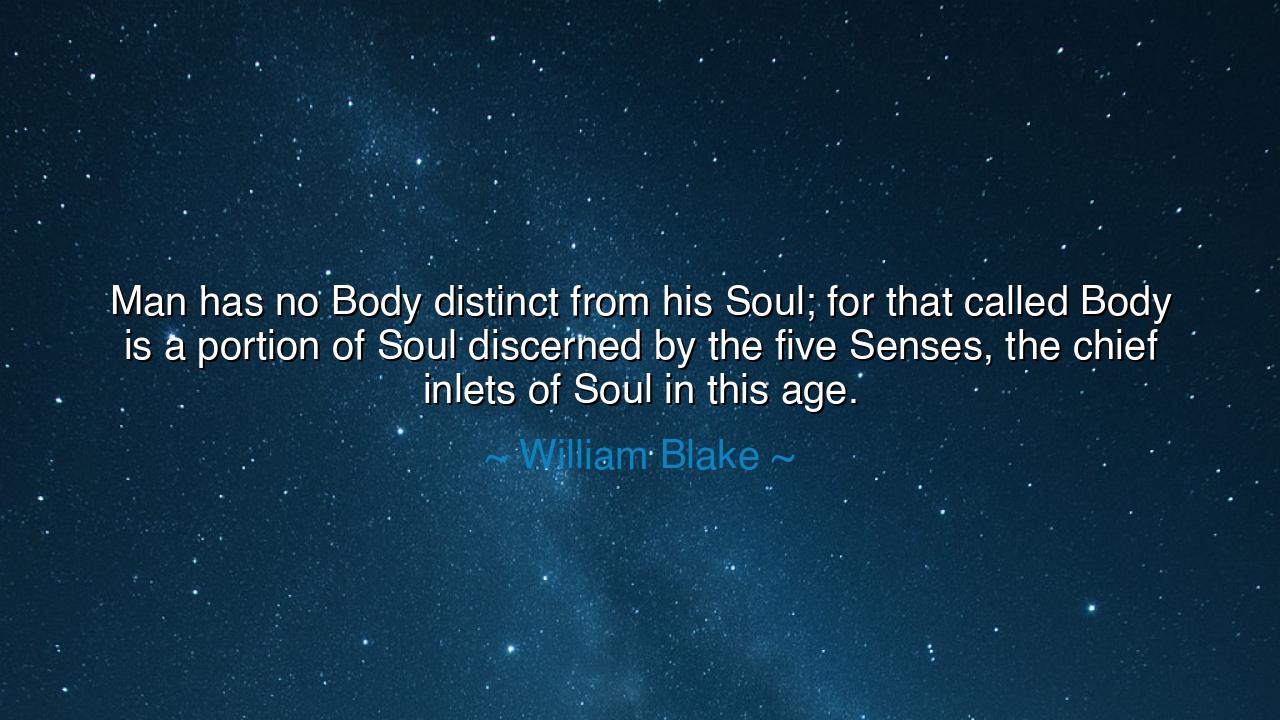
Man has no Body distinct from his Soul; for that called Body is a
Man has no Body distinct from his Soul; for that called Body is a portion of Soul discerned by the five Senses, the chief inlets of Soul in this age.






In the vast tapestry of existence, the question of the body and soul has long preoccupied the minds of philosophers, theologians, and seekers of truth. The great poet and visionary William Blake offers a revolutionary perspective when he declares: "Man has no body distinct from his soul; for that called body is a portion of soul discerned by the five senses, the chief inlets of soul in this age." With these profound words, Blake challenges the conventional separation between the physical and the spiritual, urging us to see that the body is not a mere vessel for the soul but an integral expression of the soul itself. The body is not something that carries the soul through the world; it is a manifestation, a living part of the soul, experienced and understood through the senses that connect us to the material world.
The ancients were deeply attuned to the relationship between the spiritual and the material. The great Greek philosopher Plato spoke of the soul as the eternal essence of a person, and he argued that the body, in many ways, was a mere prison for the soul, holding it in the confines of the physical world. But Blake’s vision radically shifts this view. For Blake, the body is not an obstacle to spiritual freedom; it is a direct expression of the soul’s essence. The senses—sight, sound, taste, touch, and smell—are the portals through which the soul engages with the world. They are not separate from the soul, but the very means by which the soul perceives and interacts with the reality around it. In Blake’s view, the world of the senses is holy, for it is through these senses that the soul connects with the divine.
Blake’s words also resonate with the ancient Indian philosophy of Vedanta, which teaches that the material world is not separate from the divine, but a reflection of it. The body, in this view, is a sacred manifestation of the universal soul, and the five senses are the means through which we perceive the divine presence in all things. Just as Blake sees the body as an extension of the soul, Vedanta holds that every living being is a reflection of the same divine essence, experiencing the world through the senses, which are not separate but are part of the sacred process of divine interaction. This holistic view connects the physical and spiritual realms, inviting us to see ourselves as living embodiments of the soul’s truth.
Consider the life of Leonardo da Vinci, whose art and science blurred the lines between the physical and spiritual realms. Da Vinci’s anatomical studies reveal a deep understanding that the human body is not merely a machine of flesh and bone, but a vessel of divine form. His drawings of the human body, with all its intricacies, were not just scientific investigations—they were meditations on the sacred structure of life itself. Da Vinci, much like Blake, recognized the sacredness in the body, the soul’s reflection in the material, and sought to bridge the two through his art and understanding. Through his work, Da Vinci sought to show the unity of the soul and the body, to reveal the divine truth embedded in the physical form.
Blake’s insight holds a timeless lesson for us. We live in a world that often seeks to divide the physical from the spiritual, to see the body as something separate or even in opposition to the soul. Yet, Blake’s vision calls us to reconsider this division and recognize that the body is not merely a temporary vessel, but an expression of the soul. It is through the body that we experience the world, through our senses that we perceive the richness of existence. Each touch, each sound, each image is not simply an interaction with the material world, but a connection to the very essence of who we are. Our bodies, in their beauty and their frailty, are part of the divine fabric of existence, and in honoring them, we honor the soul they carry.
The lesson here is profound: we must see our bodies not as burdens to be discarded or as separate from our spiritual essence, but as sacred vessels through which we engage with the world. Every action, every perception through our senses, is an opportunity to deepen our understanding of the soul’s journey. To honor the body is to honor the soul, for they are one and the same. Let us not view our bodies with disdain or separation from the divine, but as expressions of the sacred truth within us. Our senses are not mere physical tools—they are the windows through which we experience the divine dance of existence.
Thus, let us walk through life with a deep reverence for both our bodies and our souls, knowing that they are intertwined, inseparable, and equally sacred. Let us use our senses as portals to the divine, seeing each moment as an opportunity to connect with the soul within. Let us engage with the world with gratitude and awareness, recognizing the profound truth that the body is not distinct from the soul, but rather, it is a living, breathing embodiment of the divine. As we move through the world, let us embrace the idea that every sensation is a step on the path of understanding the deeper truth of our being.






AAdministratorAdministrator
Welcome, honored guests. Please leave a comment, we will respond soon